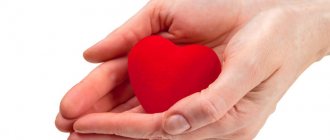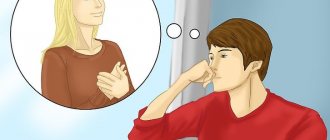Signs of love addiction
First, answer these questions honestly.
1. Have you ever thought that if someone loved you “in a special way”, you would be happy for the rest of your days?
2. Have you been obsessed with dreams of such love as in movies, books, songs?
3. Have you ever convinced yourself to love someone you weren't particularly attracted to because you needed a loving relationship right now?
4. Have you ever felt that you need to help your partner change his life already in the early stages of a relationship, but did not consider the option that he (s) is simply not suitable for you and it would be wiser to leave?
5. Have you stayed in an unhealthy relationship for a long time or returned to the same ex-partner repeatedly because you couldn't stand being alone?
6. When you're in a serious relationship, do you wonder if this is the right partner, or fantasize about a past lover, wondering if you'd be happier with him than with your current partner?
7. Do you tend to describe your vision of an ideal relationship with the expressions “made for each other”, “soul mate”, “other half”?
8. Since adulthood, what is the longest period that you have gone without being in a relationship and not worrying about it?
9. After a breakup, do you give yourself time to recover and come to your senses, or are you in a hurry to find a new lover?
10. Do you expect your partner to make you feel worthy of love and acceptance?
I won't ask you to score your answers. You already know who you are!
If, while answering these questions, you feel a vague doubt that you must be a love addict, don't beat yourself up too much. I was a member of this club myself for most of my life. I was also in love with love.
Love or addiction?
Love Addiction:
Do you come home after a date and immediately feel empty, anxious, bored and want to see each other again right away?
Do you want to be together continuously? Only together can you feel calm and feel good? More than anything in the world, are you afraid of losing a relationship, being left alone? Are you anxiously and with bated breath waiting for a response to a sent letter or SMS? Do you feel uneasy when your loved one doesn’t pick up the phone or can’t talk to you? Having fallen in love, do you give up everything you do and are ready to run to the ends of the earth just to be together? Does this kind of relationship happen over and over again? This is LOVE ADDICTION! Love addiction
is a very common problem, but it has a solution! If you are tired of suffering, stepping on the same rake, and are ready to start changing your life, I invite you to make an appointment with me. In the process of psychoanalytic psychotherapy, we will be able to figure out what is behind your love addiction, understand why you are building your life this way, find the resources of your “I” and change it. For my part, I am ready to offer you a helping hand and a reliable point of support so that you can learn to cope with the most difficult emotional states that control you. In addition to individual psychoanalytic therapy for love addiction, you can go to a client psychoanalytic group. By joining a group, you will be able to develop the ability to receive support not only from the leaders, but also from group members who are experiencing similar states to one degree or another, and this is always very important on the path to overcoming love addiction.
Case study: Love addiction as a search for mother.
Victoria, a young girl of 27 years old, turned to me for help with the problem of love addiction. Despite her physical attractiveness and pleasant manner of communication, none of her relationships lasted more than three months. Everything developed according to the same scenario: Vika fell in love and won over men. As soon as they started dating and sexual relations began, she became emotionally attached to the object of her love, leaving no personal space for men. A constant desire to be together, endless resentment, anxiety and excitement, jealousy and suspicion. All this quickly destroyed the relationship and led to the fact that men simply disappeared from her life, sometimes without even writing a farewell SMS. After the breakup, Vika fell into depression. A friend with whom she rented an apartment pulled her out of depression. Despite the fact that the apartment was a two-room apartment, she lived with a friend in one room, and the second room was empty. As it turned out later, behind this was a strong fear of loneliness, coming from childhood.
Victoria, a young girl of 27 years old, turned to me for help with the problem of love addiction. Despite her physical attractiveness and pleasant manner of communication, none of her relationships lasted more than three months. Everything developed according to the same scenario: Vika fell in love and won over men. As soon as they started dating and sexual relations began, she became emotionally attached to the object of her love, leaving no personal space for men. A constant desire to be together, endless resentment, anxiety and excitement, jealousy and suspicion. All this quickly destroyed the relationship and led to the fact that men simply disappeared from her life, sometimes without even writing a farewell SMS. After the breakup, Vika fell into depression. A friend with whom she rented an apartment pulled her out of depression. Despite the fact that the apartment was a two-room apartment, she lived with a friend in one room, and the second room was empty. As it turned out later, behind this was a strong fear of loneliness, coming from childhood. During psychotherapy, Victoria was able to tell a story about an emotionally cold and distant mother, who often left her at home alone in the evenings, going to visit her friends. A picture of a small, unhappy girl, terrified of loneliness, looking for warmth and love from an inaccessible and cold mother, opened before us. When Vika realized this, she began to choose weaker and more dependent men in her relationships. She kept them at a distance, sometimes bringing them closer, sometimes moving them away from her, often disappeared with her friend and abandoned them. Essentially, this was acting out my childhood position. She placed her unhappy child part in men, and she herself played the role of a cold, arrogant and distant mother. When, in the course of further analysis, she was able to realize her acting out and understand that this only temporarily helps to drown out the pain of loneliness, Vika was able to force herself to work through the topics of loneliness, self-esteem, resentment towards her mother and restore the resources of her own “I”. Over time, Vika began to form her own personal space, not to get involved in dependent relationships, write a diary, live in a separate room, and then completely moved out of her friend’s place, taking out a mortgage on the apartment. Gradually, the result of therapy was that Vika was able to spend time alone, keeping herself busy, or simply thinking about her life. When Vika was able to arrange her space, understand what kind of relationship she still needed, she found a man with whom she first began to be friends and then date (previously Vika tried to immediately start living with a man, without figuring out how much she liked him and suits her) - and it was already a stable relationship without anxiety, fear of loss, obsession and love addiction.
Read more
Do you have a love addiction? Call! 8-926-256-20-78 . Make an appointment from 10.00 to 23.00 daily. Make an appointment with Dmitry Basov in Moscow - ON-Line
The cost of consultation and the address of the appointment are indicated in the section: Contacts If necessary, psychotherapy via Skype is possible.
How to distinguish love from love addiction?
Now this is a very pressing question that both women and men ask themselves. If previously long-term love addiction was mainly characteristic of women, recently more and more men are seeking psychological help with such a problem. These are the trends of our time. How often do you hear such phrases: “I can’t live without him/her,” “when he’s not around, I don’t find a place for myself.” Looking at this from the outside, a simple man in the street could say that this is “great love,” although upon closer examination this turns out to be the first manifestations of love addiction. So what is love addiction, and how does it manifest itself? Love addiction is an emotional state that mostly consists of suffering, great fear of losing a partner, feeling weak, small, lonely and lost without him. This is expressed in a constant desire to control the partner, and from here strong jealousy develops. Often, on a conscious level, a person sees all the shortcomings of his partner, but still continues to desperately need him. Another characteristic feature of love addiction is the desire to dissolve in a partner, merge with him, live his life and his interests. At the same time, one’s own desires and interests fade into the background or disappear: “I’m not interested in anything except him.” As a rule, from a psychological point of view, behind love addiction is low self-esteem, self-doubt and fear of loneliness. The differences between love and love addiction are especially pronounced in the situation of a breakup. With love addiction, a person experiences ambivalent (contradictory) feelings, in which there is a lot of jealousy and even hatred. If, in case of love addiction, you ask a person a question: “Would it be easier for you if your partner did not leave you, but died?” - with sufficient frankness, we will receive a clear answer: “Yes.” Is this possible in love? Of course not! When the person we love leaves us, it is painful and difficult, but jealousy and hatred do not arise. “True love lets go” (B. Hellinger). This letting go is accompanied by sadness and longing, but warm feelings and love remain for the partner. A loving person says: “I wish happiness to the one I love, and if he is better off with someone else than with me, I will let him go.” The famous psychologist and psychotherapist Erich Fromm in his book “The Art of Loving” defined love: “Love is an active interest in the life and development of the object of love.” This definition helps us see how love manifests itself in a relationship. In love, unlike love addiction, each partner feels and realizes his individuality, each sees and takes into account the interests of the other and maintains his own space and interests. In love, we accept our partner with all his characteristics and do not strive to change him. With love addiction, we love not a real person, but a fantasy image, which, as a rule, reminds us of someone from childhood. Love addiction is built on the mechanisms of psychological projections: “if I invented you, become what I want!” Dependent relationships are characterized by constant claims to each other and the desire to remake your partner so that he meets your expectations. If we talk about love addiction, then partners are in a relationship because they feel bad without each other; if we talk about love, then people strive to be together because they feel good together, but at the same time they calmly experience separation and loneliness. If we talk about the help of a psychologist with love addiction, then its main tasks are: increasing self-esteem, finding internal resources for self-acceptance, as well as working through childhood experiences in which patterns of helplessness and dependence were laid down.
The cost of consultation and the address of the appointment are indicated in the section: Contacts If necessary, psychotherapy via Skype is possible.
TO THE PSYCHOLOGIST
MAKE AN APPOINTMENT
What is love addiction?
Love addiction has become an area of my professional interest. For many years I have worked with people who have difficulty finding the right partner and creating a healthy union, who are caught in a vicious cycle of pain and disappointment in themselves and others.
They believe that the problem is either that they found the “wrong” person or that the love has “faded.” Some people jump from one relationship to another in pursuit of the wonderful feeling of being in love. Others remain in relationships despite feelings of dissatisfaction, secret thoughts of breaking up, and soon develop emotional (or very real) affairs on the side, without understanding the root of the problem.
Let's be clear: Addiction of any kind is a compulsive (that is, repeated against the will) and chronic (long-term) pattern of using a certain substance or behavior in order to achieve a state of comfort or arousal in order to “cure” distressing emotions and feelings. Addicts tend to continue using their drug despite the negative consequences of addiction.
Sexual addiction is a compulsive pattern of pursuing sexual stimulation without emotional attachment. Love addiction is more difficult to define, because by our nature we are all dependent on love in one way or another: we crave it and need it, we think about it. We all need affection to survive, and we intuitively strive to form connections with other people, especially romantic ones. There is nothing unhealthy about this desire for love.
Love addiction is a compulsive, chronic craving for romantic love in an attempt to fulfill one's need for a sense of security and self-worth through another person. At the stage of falling in love, the need seems to be fulfilled, but as soon as the feelings naturally reduce their intensity, disappointment and emptiness return. The negative consequences of such unfulfilled expectations can be devastating, but the addict enters into relationships again and again, continuing to believe that love can improve his life.
Based on my experience, the most difficult love addicts to treat are those who build relationships with several people at once and torment themselves with the question of who to choose. They really believe that the main problem here is to decide which partner is “the one.”
Where does love addiction come from?
The causes of love addiction are not difficult to recognize: insufficient care and attention from significant adults, low self-esteem, lack of positive examples of healthy relationships, socially imposed beliefs about ideal romantic love (“and they lived happily ever after”).
But, unfortunately, understanding where you have this problem does not help solve it. Information is not able to take and change the unconscious desire to find a mate at any cost.
After leaving a dysfunctional relationship, my clients often say:
“Wrong guy! I'll never fall for something like that again. Next time I’ll find someone who’s nothing like this.”
“I don't want to date anyone. I just want to spend time with someone occasionally.”
“Next time I won’t rush into a relationship.”
Unfortunately, it doesn't work. Here are some facts about where love addiction will lead you if you enter into a new relationship without learning from your painful experiences:
1. If you are looking for the complete opposite of your previous partner, remember that the opposite of a sick person is a sick person! With this approach, you simply jump from one extreme to the other and end up in the same place - in a destructive relationship.
2. Your new “just friend”, with whom you will “occasionally” spend time, will sooner or later turn into your next lover, and everything will end the same as before.
3. Saying that next time you will “take your time” will remain just words when the hormones kick in and your crush starts making decisions for you. And love is blind.
The truth is this: wherever you go, you will end up back there. The problem is your behavior patterns, not your partner.
Who do we choose
The people we choose often have the same level of vulnerability and emotional strength. The more you work on healing, the more you learn to lovingly care for yourself, making yourself more attractive to someone who is doing the same.
If you choose a person based on your wounded self, you will attract someone who you feel wants to fill your inner emptiness. The problem may be that the other person is trying to fill your emptiness, hoping that you will fill them. What we end up with is two people who want to receive love rather than give, and they will end up disappointed in each other. They will blame each other for not being loved the way they expect.
When relationships end, most of the time it is because one or both partners do not take responsibility for their own feelings and blame others for their unhappiness as a result.
If you are so stuck that you feel it is impossible to live without a person, you seriously need to learn to give to yourself and others the same thing that you want to receive from another person. You must work to become the kind of person you want to be around. Isn't it wonderful to be truly in love and not addicted? You will be able to love another person for who they are, rather than just needing what that person can do for you.











